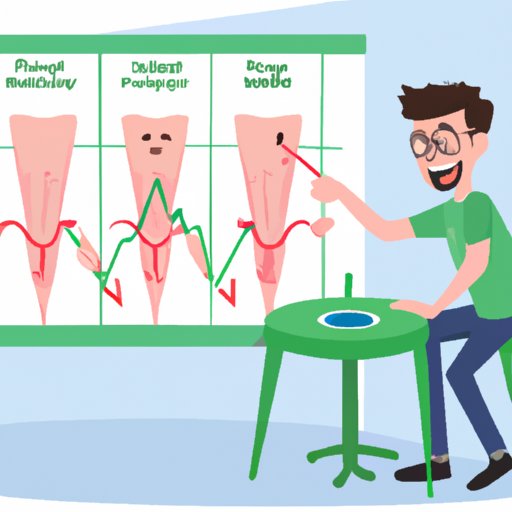
I. Introduction
Have you ever felt the urge to urinate more often than usual, especially at night? Frequent urination, also known as urinary frequency, is a common condition that affects people of all ages, genders, and backgrounds worldwide. It can severely impact your quality of life, leading to sleep disturbances, anxiety, and even depression. This article aims to provide you with a comprehensive guide to understanding the causes of frequent urination, adopting healthy habits, adjusting your diet, seeking medical treatments, and trying natural remedies. By following the advice provided in this article, you can manage your symptoms and enjoy better bladder health.
II. Understanding the Causes
Frequent urination is a condition where you urinate more frequently than normal, and the volume and frequency of urination may vary depending on the root cause. Common symptoms include the need to urinate more than 8 times a day, with or without pain, and frequently waking up at night to urinate.
The main causes of frequent urination mainly stem from underlying health issues like urinary tract infections, bladder infections, or medication side effects. The most common causes include:
- Urinary Tract Infection (UTI)
- Bladder or Prostate Problems
- Medications that Affect Bladder Function
- Caffeine, Alcohol, and Artificial Sweeteners Consumption
- Stress and Anxiety
Understanding the causes of your condition is the first step in adopting the right approach and seeking appropriate treatment. However, some causes may require medical attention, so it is always wise to consult with your doctor before making any significant changes to your lifestyle or diet.
III. Healthy Habits to Adopt
Frequent urination is not necessarily a symptom of an underlying medical condition, but rather an indicator of poor bladder habits or lifestyles. Simple lifestyle changes and healthy habits can significantly improve bladder function and reduce urination frequency. Some of these healthy habits include:
- Drinking enough water to stay hydrated: drinking at least six to ten 8-ounce glasses of water per day can help keep the bladder in good condition.
- Practicing good toilet habits: following a regular schedule, urinating completely, and avoiding straining too hard.
- Reducing caffeine and alcohol intake: caffeine and alcohol increase urine production and irritate the bladder, exacerbating the symptoms.
- Exercising regularly: physical activity helps reduce stress and maintain a healthy weight, reducing the risk of incontinence.
- Practicing relaxation techniques: meditation, deep breathing, and yoga can help reduce anxiety and stress, relieving urinary urgency and frequency.
IV. Diet
What you eat and drink significantly affects your bladder health, and you can modify your diet to reduce the frequency of urination. Here are some dietary considerations to keep in mind:
Foods that Promote a Healthy Bladder:
- Cranberry juice: It reduces the risk of UTIs
- Green leafy vegetables: They are rich in vitamins B and C, promoting a healthy bladder function
- Probiotics: They prevent bad bacteria in your gut which can cause urinary infections and bladder issues
- Watermelons: They contain high levels of water and help decrease inflammation in the urinary tract
Foods to Avoid or Consume in Moderation:
- Spicy Foods: They can irritate the bladder, leading to increased urination.
- Carbonated drinks: They can increase the pressure in the bladder, making you feel the urge to urinate often.
- Citrus fruits: These contain ingredients that can irritate the bladder and worsen urinary urgency and frequency
- Artificial sweeteners: Aspartame and other artificial sweeteners have been associated with increasing urination frequency.
- Alcohol and caffeine: These substances promote urine production and irritate the bladder.
V. Medical Treatments
Medical treatment can provide relief, particularly when you experience frequent urination as a symptom of an underlying medical condition. Medical treatments for frequent urination include:
- Antibiotics, which are used to treat caused by urinary tract infections.
- Medications that relax the bladder, like anticholinergics, which help reduce urinary urgency and frequency.
- Alpha-blockers or 5-alpha-reductase inhibitors to relieve symptoms of an enlarged prostate gland.
- Muscle-strengtheners like electrical stimulation or physical therapy to strengthen urinary muscles.
- Laser therapy or surgery to treat bladder-related issues like low bladder capacity and overactive bladder or stress incontinence.
Medical treatments can have side effects, and you should always consult with your doctor before starting any treatment plan.
VI. Natural Remedies
Natural remedies may not be as effective as medications or medical procedures, but they can help manage mild cases of frequent urination. Some of these remedies include:
- Herbal supplements like saw palmetto, pumpkin seeds, and cranberry supplements.
- Acupuncture, which may help relax the bladder and reduce spasms.
- Hypnotherapy and cognitive-behavioral therapy to help you relax and reduce stress and anxiety.
- Reducing stress using techniques like yoga, meditation, and visualization can improve the condition.
VII. When to See a Doctor
It is wise to see a doctor if the frequency of your urination becomes too frequent or uncomfortable or if your symptoms persist or worsen over time despite making lifestyle changes or taking natural remedies. Your doctor may perform several tests, like a urine sample test, to check for infections or other underlying causes. You should also seek medical attention if you experience other symptoms like blood in urine, pain, burning, and a fever.
VIII. Conclusion
Frequent urination can be challenging to live with, but it is manageable with the right approach. By adopting healthy habits and diet, seeking help from a medical professional, and trying natural remedies, you can improve your bladder function, reduce the frequency of urination, and enjoy a better quality of life. Take the necessary steps to manage the cause of your condition, and always seek medical advice when in doubt.





